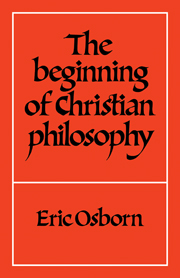Book contents
- Frontmatter
- Contents
- PREFACE
- REFERENCES
- ABBREVIATIONS
- 1 CHRISTIAN ARGUMENT
- 2 PEOPLE AND PLACES
- 3 THE GOD ABOVE
- 4 THE RATIONAL LAUGHING ANIMAL
- 5 COSMOS AND CREATION
- 6 HISTORY
- 7 THE SHORT WORD
- CONCLUSION
- APPENDIX
- BIBLIOGRAPHY
- INDEX OF BIBLICAL CITATIONS
- INDEX OF CITATIONS FROM ANCIENT AUTHORS
- INDEX OF CITATIONS FROM MODERN AUTHORS
- GENERAL INDEX
- Frontmatter
- Contents
- PREFACE
- REFERENCES
- ABBREVIATIONS
- 1 CHRISTIAN ARGUMENT
- 2 PEOPLE AND PLACES
- 3 THE GOD ABOVE
- 4 THE RATIONAL LAUGHING ANIMAL
- 5 COSMOS AND CREATION
- 6 HISTORY
- 7 THE SHORT WORD
- CONCLUSION
- APPENDIX
- BIBLIOGRAPHY
- INDEX OF BIBLICAL CITATIONS
- INDEX OF CITATIONS FROM ANCIENT AUTHORS
- INDEX OF CITATIONS FROM MODERN AUTHORS
- GENERAL INDEX
Summary
The present movement of Western civilisation away from Christianity has directed attention to earlier days when Christians were a small part of a Roman world of pluralistic beliefs; they came before, we come after, Christendom. Claims for relevance, however, are always competitive and need to be argued. What drives twentieth-century Western man back to the second and third centuries? Initially there is little more than a vague feeling that Christendom was a mistake, that ecumenical councils in the fourth and fifth centuries achieved less than they claimed, that the classical dogmatic formulations are too ambiguous to be helpful. Clearly this response is not enough. Christendom was not an unqualified mistake and its assessment is the task of a lifetime and not of an impulse. The best ecumenical councils may well be those that seem to achieve little; ambiguity of creeds and councils invites further analysis before resignation.
The importance of the second century and the apologists is best seen in the emergence of Christian argument; but Christians have argued about so many strange things that the area of argument is important. The claim of the enthusiast for early Christian thought is that the problems that Christians faced in a pluralistic world, then, have a close relation to those that they face now: the problems were more general and more philosophical (Is there one God? Can man speak of him? Is man free? Why is there evil in God's world?) than the dogmatic issues of the fourth and fifth centuries.
- Type
- Chapter
- Information
- The Beginning of Christian Philosophy , pp. 1 - 17Publisher: Cambridge University PressPrint publication year: 1981



